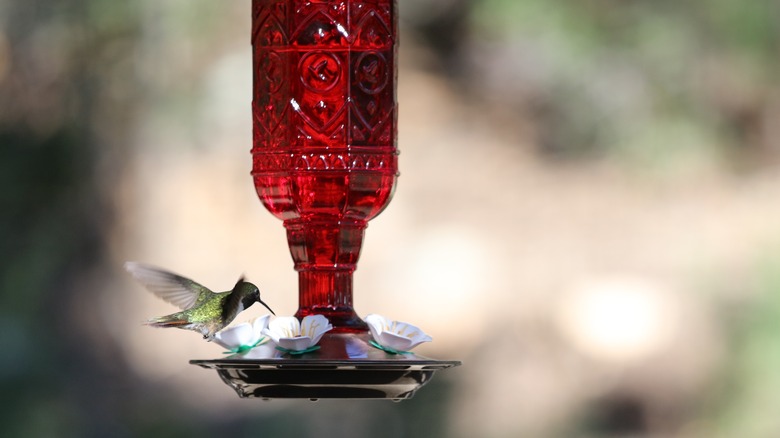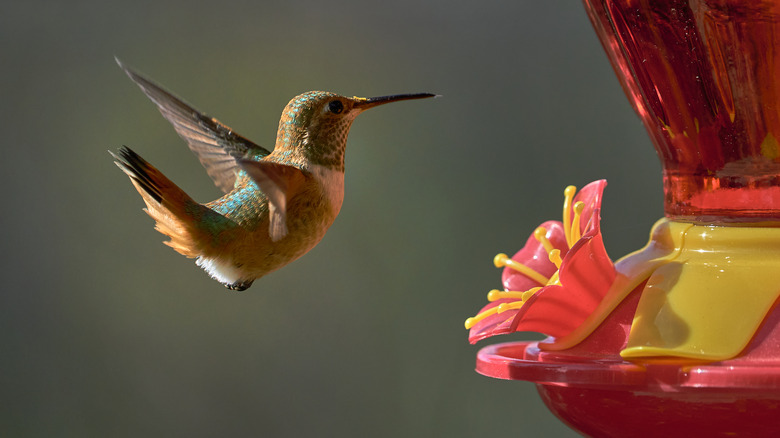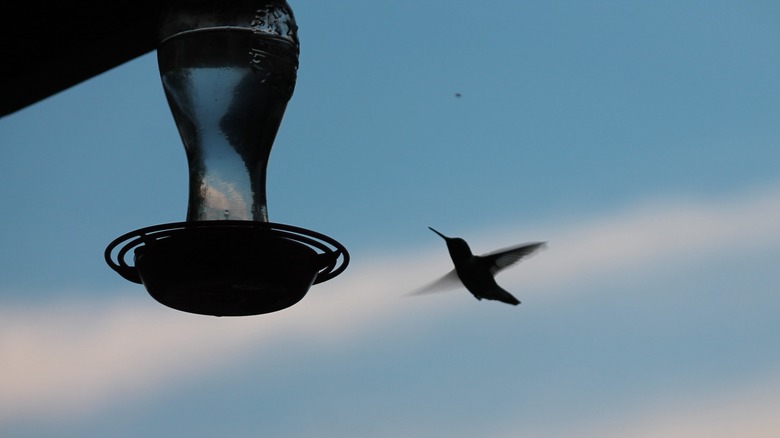Steer Clear From Offering This Liquid For Hummingbirds To Drink
Hummingbirds are a miracle of nature and provide some fantastic benefits to your home garden. Not to mention, they're beautiful creatures that are pleasant to have around and oh-so entertaining to watch! Aside from planting your garden with hummingbird favorites or setting up cool and refreshing water features for hummingbirds to bathe, a simple way of attracting these flitty fliers is with a hummingbird feeder. It's a great way to get these small, flying friends to gravitate towards your home. However, some enthusiasts may be doing something that's actually harming the hummingbirds, rather than helping them.
Kool-Aid is a hummingbird feeding D.I.Y. myth, that, at first glance, appears to make sense. It's sugary, brightly colored, and easy to mix and pour ... why wouldn't it be a good solution for hummingbirds? Simply put, the artificial additives in Kool-Aid can be damaging to hummingbirds. In fact, many things you may think is a good substitute for nectar, like honey or molasses, are actually harmful for these friends in flight. Other than refined white sugar and nectar solutions, hummingbirds need little from well-meaning humans, and can find their fix in nature with flowers and insects. So how can you best feed your favorite hummingbird visitors with all this in mind? Steer clear of the Kool-Aid, and offer them sugar instead!
Don't feed hummingbirds Kool-Aid, but try this mixture instead
According to the Smithsonian National Zoo and Conservation Biology Institute, using anything but refined sugar or nectar mixtures can cause hummingbirds to ingest additives that they cannot handle. If you use powdered sugar (confectioner's sugar) for instance, you maybe feeding hummingbirds additives, like cornstarch. Generally, chemical additives are harmful to hummingbirds and superfluous ingredients in other sugary substitutes aren't good for hummingbird health either. On top of this concern, the Kool-Aid fallacy promotes another myth that red colors in the liquid will attract hummingbirds. In reality, the synthetic dyes in Kool-Aid don't provide a benefit to these small birds, and the color of the feeder, often accented with red details, is enough to bring hummingbirds to your garden. Of course, you can do many clever things to add red to your garden to attract hummingbirds that don't call for harmful Kool-Aid use.
The cleanest and healthiest substance to put in a feeder is actually the simplest. Liquid or powder nectars are the best options, particularly for larger feeders, and can be purchased at home supply stores or gardening centers. Smaller feeders can welcome hummingbirds with a simple D.I.Y. mixture of refined, white sugar and water. Simply boil down 1 cup of sugar in 4 cups of water to get the optimal sustenance for your garden guests. Another reminder that any other sweet treat is an absolute no for hummingbird health, so be wary of other hummingbird food myths!
Avoid these other household hummingbird food myths
Since hummingbirds consume nectar, it's easy to mistake other sugary household items as good hummingbird food alternatives. However, there are some ingredients you should never feed the hummingbirds visiting your yard. Most sugar-related substances like molasses, confectioner's sugar, and brown sugar have more added ingredients than the plain white sugar you should be using that don't benefit (and may even harm) hummingbirds. Beyond these additives, hummingbird lovers should also avoid using honey since it attracts fungal growth in a feeder that is harmful to hummingbirds when ingested.
Remember, fermentation of and bacteria from any sugary substance, nectar mixtures and sugar water included, can cause harm to hummingbirds, so be sure to change the mixture every three to five days and to clean the feeder at least once a week. Avoid using dish soap — which also has some sneaky additives you don't want to introduce to hummingbirds — and instead use hot tap water or a diluted vinegar solution. If you listen to all of these feeder tips, you'll be sure to have some happy humming friends in your garden!


